Description
This course features three excellent presentations on early childhood oral health and prevention emphasizing collaborative care with other professionals, motivational interviewing and alternative treatment options to managing caries. For more information about this program and the speakers: Download the Meeting Brochure.
“Early Childhood Oral Health: Improving Collaborative Care in Clinical Practice”
Presented by Rocio B. Quinonez, DMD, MS, MPH
Oral health inequities call for an evaluation of medical and dental collaborations that can promote early childhood oral health. The integration of primary health care professionals and general dentists is key, as they are often the first in line to identify such disparities and can deliver preventive oral health services to help shift trajectories of oral health. This session will focus on pediatric oral health initiatives, using North Carolina as a case study to promote preventive oral health models in primary care settings. Dr. Quinonez will review educational initiatives that encourage collaborative care and address current barriers for successful early childhood oral health integration.
“Infant Oral Health and Prevention: Motivational Interviewing and Sticky Situations”
Presented by Maria Cordero-Ricardo, DMD, MS
Motivational Interviewing is a client-centered interaction originally designed for people presenting for substance abuse treatment to self-motivation and methods for positive change. In pediatric dentistry the most challenging substance abuse we face is sugar and refined carbohydrates. They are challenging to quit and everywhere in our daily lives. This session will give practitioners a new tool for counseling the families in their practices for successful prevention outcomes using techniques
adapted for dentistry.
“Alternative Treatment Option to Dental Restorations and Managing Caries”
Presented by Elise W. Sarvas, DDS, MSD, MPH
Educational Objectives:
Dr. Quinonez’s Objectives:
- Provide background on early childhood oral health trends
- Review rationale and evidence of collaborative care in early
childhood - Review successes and opportunities to promote
collaborative early childhood oral health care in clinical
practice
Dr. Maria Cordero-Ricardo’s Objectives:
- Be familiar with the principles of motivational interviewing
within the context of dentistry - Reorganize the conversation during preventive visits to
foster positive behavioral changes
Dr. Elise W. Sarvas’ Objectives:
- Be familiar with the current shift from a surgical
management paradigm to a medical management of dental
caries - Understand the benefits and indications for the use of silver
diamine fluoride for arresting carious lesions in pediatric
dentistry
CE Credit Units:
3 CEUs
Level of skill recommended for participants:
Of interest to Dentists, Students & Residents, Auxiliaries and Office Staff
Instructor Info:
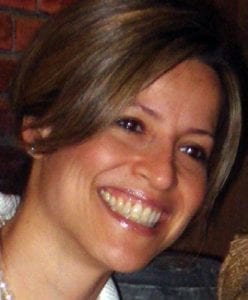 Rocio B. Quinonez, DMD, MS, MPH earned her Bachelor of Arts Degree in Psychology/Zoology in 1992 and her Doctorate of Medical Dentistry in 1996 from the University of Manitoba. She earned her certificate in Pediatric Dentistry, Master’s of Science, and Masters in Public Health and Administration at the UNC at Chapel Hill. Dr. Quinonez proceeded to complete a NIH Fellowship in Oral and Systemic Diseases. Her academic and research interest include the interphase between medicine and dentistry, perinatal and infant oral health, and economic analyses related to children’s oral health. Dr. Quinonez returned to full-time academics in the summer of 2006 and is currently the Director of the Pediatric Dentistry Pre-Doctoral Program, the Baby Oral Health Program and the Pediatric Dental Faculty Practice at the UNC at Chapel Hill.
Rocio B. Quinonez, DMD, MS, MPH earned her Bachelor of Arts Degree in Psychology/Zoology in 1992 and her Doctorate of Medical Dentistry in 1996 from the University of Manitoba. She earned her certificate in Pediatric Dentistry, Master’s of Science, and Masters in Public Health and Administration at the UNC at Chapel Hill. Dr. Quinonez proceeded to complete a NIH Fellowship in Oral and Systemic Diseases. Her academic and research interest include the interphase between medicine and dentistry, perinatal and infant oral health, and economic analyses related to children’s oral health. Dr. Quinonez returned to full-time academics in the summer of 2006 and is currently the Director of the Pediatric Dentistry Pre-Doctoral Program, the Baby Oral Health Program and the Pediatric Dental Faculty Practice at the UNC at Chapel Hill.
 Maria Cordero-Ricardo, DMD, MS is Clinical Assistant Professor at Stony Brook University, School of Dental Medicine. She obtained her DMD from The University of Medicine and Dentistry of New Jersey and her certificate in pediatric dentistry as well as a master’s degree from The Ohio State University College of Dentistry and Nationwide Children’s Hospital. She maintains a clinical practice in Massapequa, NY and medical staff membership at Stony Brook Children’s Hospital. She is a diplomate of the American Board of Pediatric Dentistry and a member of the American Academy of Pediatric Dentistry Leadership Institute. Her research interests include palliative care for pediatric hematology patients, pediatric dental workforce, and extraprofessional collaborative practice.
Maria Cordero-Ricardo, DMD, MS is Clinical Assistant Professor at Stony Brook University, School of Dental Medicine. She obtained her DMD from The University of Medicine and Dentistry of New Jersey and her certificate in pediatric dentistry as well as a master’s degree from The Ohio State University College of Dentistry and Nationwide Children’s Hospital. She maintains a clinical practice in Massapequa, NY and medical staff membership at Stony Brook Children’s Hospital. She is a diplomate of the American Board of Pediatric Dentistry and a member of the American Academy of Pediatric Dentistry Leadership Institute. Her research interests include palliative care for pediatric hematology patients, pediatric dental workforce, and extraprofessional collaborative practice.
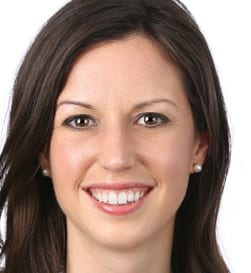 Elise W. Sarvas, DDS, MSD, MPH completed her specialty training in pediatric dentistry at the University of Washington and Seattle Children’s Hospital. While there, she completed masters’ degrees in dentistry (Pediatric Dentistry) and public health (Health Services) as well as a certificate in Maternal and Child Health. Dr. Sarvas earned her Doctor of Dental Surgery degree from the University of North Carolina at Chapel Hill. Dr. Sarvas is currently a Clinical Assistant Professor at the University of Minnesota and teaches dental students, dental therapy students, medical students, and pediatric dental residents at the dental school and Masonic Children’s Hospital in Minneapolis, MN.
Elise W. Sarvas, DDS, MSD, MPH completed her specialty training in pediatric dentistry at the University of Washington and Seattle Children’s Hospital. While there, she completed masters’ degrees in dentistry (Pediatric Dentistry) and public health (Health Services) as well as a certificate in Maternal and Child Health. Dr. Sarvas earned her Doctor of Dental Surgery degree from the University of North Carolina at Chapel Hill. Dr. Sarvas is currently a Clinical Assistant Professor at the University of Minnesota and teaches dental students, dental therapy students, medical students, and pediatric dental residents at the dental school and Masonic Children’s Hospital in Minneapolis, MN.
Instructor Disclosure of any conflicts of interest:
None disclosed
Refund Policy:
There are no refunds for CSPD Online CE courses. For any questions, please contact CSPD Executive Director, Paul Reggiardo, DDS, at preggiardo@cspd.org
Legal Disclaimer:
The CE provider (CSPD) uses reasonable care in selecting and providing content that is accurate. However, the CE provider does not independently verify the content or materials. The CE provider does not represent that the instructional materials are error-free or that the content or materials are comprehensive. Any opinions expressed in the materials are those of the author(s) of the materials and not the CE provider. Completing one or more continuing education courses does not provide sufficient information to qualify the participant as an expert in the field related to the course topic or in any specific technique or procedure. The instructional materials are intended to supplement rather than substitute for the knowledge, expertise, skill and judgment of a trained health care professional.
Privacy Policy
The continuing education website of the California Society of Pediatric Dentistry is www.CSPD.org/oce. We respect the privacy of the users to the site. The Privacy policy addresses our use of the information collected by virtue of your use of www.CSPD.org/oce.
The information we collect on our website is used to improve the content and to advance our mission of exceptional online continuing education.
We may collect the domain name and the IP address of visitors to our and use statistical software to create aggregate and user-specific information on the pages that our users visit. Email addresses may also be collected from purchases and/or user registrations.
We use cookies that enable us to administer our website more effectively in the transmission of online education.
You have the right to contact us in any matters that pertain to your privacy and we will promptly correct inaccuracies that may appear.
We use industry-standard encryption technologies when transferring and receiving consumer data exchanged on our site. When users make payments via credit cards, we only submit the information needed to obtain payment to the appropriate clearinghouses. We do not store or reuse this credit card information unless you have given us your authorization.
Educational Policy
![]()
The California Society of Pediatric Dentistry (CSPD) is an ADA CERP Recognized Provider Approved by the American Academy of Pediatric Dentistry. ADA CERP is a service of the American Dental Association to assist dental professionals in identifying quality providers of continuing dental education.
ADA CERP does not approve or endorse individual courses or instructors, nor does it imply acceptance of credit hours by boards of dentistry. Concerns or complaints about a CE provider may be directed to CSPD at (916) 231-2142 or to ADA CERP at www.ada.org/cerp
Credit is awarded on an hour-for-hour basis. Each attendee should claim only those hours of credit that he or she was in actual attendance of the educational activity. Participants should retain this document for their records.
Original Continuing education certificates are subject to Dental Board of California audit and should be retained by the licentiate for a period of six years. Completion of these courses does not constitute authorization for the attendee to perform any services that he or she is not legally authorized to perform based on his or her license or permit type. This course meets the Dental Board of California’s requirements for above designated units of continuing education.


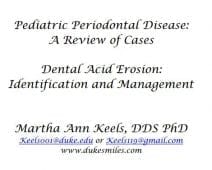
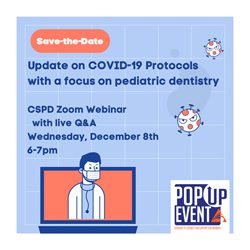

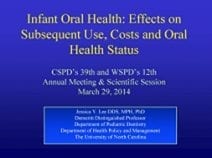
Reviews
There are no reviews yet.